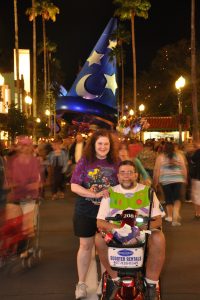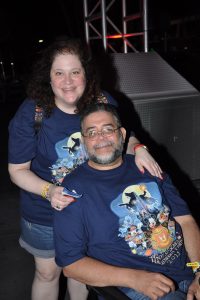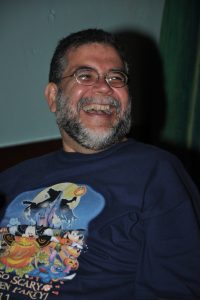Rediscovering Myself Through- And After- Caregiving

Yesterday, I went to see New York City Ballet perform Jewels. It’s one of the first ballets I ever saw. I saw my first NYC Ballet, The Nutcracker, at age three and was enthralled by ballet from that young age. I read about Jewels and my mom took me to see it at Lincoln Center. How lucky was I? Going to the theater or ballet is my favorite activity and my most loved way to lose myself and feed my soul. As I walked to Lincoln Center, after making a last-minute decision to get a ticket, I thought about my caregiving days. As Ben’s ALS was progressing and he was nervous about being alone, I could not simply make a quick decision to go to the theater or ballet. It had to be planned in advance and Ben had to negotiate with his daughter to stay with him. I went from being someone who saw everything to someone who barely knew what was on Broadway. It was a choice I made with no regrets, and I can still look back and know that I did the right thing for Ben and for me and for us, but I also admit that I did not take care of myself, physically or emotionally.
As I watched the ballet, I thought about how I can now spend my time as I choose. Even after three years, I’m still not entirely comfortable saying that. I don’t want it to be construed as my having any sense of relief that I am free from a burden. It was hard work that was also loving and meaningful, and unquestionably the most important thing I have ever done, although I did lose a part of myself in the process. After I lost my dad and Ben, returning to the theater and ballet helped me distract myself from grief, sort through feelings, and rediscover myself. There were and there continue to be times when events are not as fulfilling and enjoyable as I wish they would be because I profoundly feel Ben’s absence. But, I have established new normals, new routines and an evolving sense of myself. The arts are the way I take care of myself- I can think, imagine, reflect and just enjoy the magic. I feel fortunate that my passion for the arts has always helped me to heal and grow.
When I think back on my caregiving days, I remember that I constantly struggled with feeling detached from life. I tended to put caring for myself aside, always concerned that worrying about myself was being selfish. Of course, my indulging in arts events seemed so trivial compared to Ben’s battle with ALS. But, as Ben’s needs increased and his denial of that persisted while the devastation clearly affected both of us, I grew more isolated from people and things I loved and I became resentful, angry and frightened. Reconciling those negative feelings and the guilt for feeling them has not been easy.
Throughout my caregiving days, the people around me told me that I HAD TO take time for myself. It really irritated me, because it was stating the obvious but also felt impossible. I could not voice my need to take care of myself. In my mind, since my dad and Ben were ill, they were the ones who mattered. On the occasions that I was able to go out, those things didn’t offer the same satisfaction that they did before, because I never went with Ben, I felt guilty for going out and because I was worried about what was going on at home if I was not there, and lamenting what I missed: the life we had, who we were before illness took over, the things that I, and we, couldn’t do.
It was through our love for Disney films that I discovered my greatest source of self care. Ben and I loved to watch Disney movies, and what I found was that the films were more than simply distracting and entertaining together time. I was seeing the films in a whole different way when I watched them through the eyes of a caregiver. They were shedding light on my caregiving situation. Disney films let me feel understood because they tapped exactly what I was feeling and gave me perspective on a situation that was very daunting. They were simultaneously giving me a much needed break from reality and letting me think through my feelings about my reality. While having someone stay with my husband while I went out was sometimes possible, though less and less ideal, I realized that I was so busy thinking that taking care of myself meant planning a major outing, and dwelling on the negatives like the help that I didn’t have, that I didn’t see that taking time to watch a Disney film was also time to reflect and enjoy my own company right within our apartment!
What turned out to be the most valuable thing I did for myself was that I began keeping a journal of the Disney quotes, films and characters that made an impact on me and I wrote about how they related to my experiences in caregiving. Writing was always a passion of mine, but I stopped writing in my journal because I felt like I kept repeating the same issues without finding solutions. By creating this journal, I unexpectedly combined my love of Disney and writing with my caregiving, and held onto a vital part of myself without having to leave home.
Collecting and writing about Disney things gave me an opportunity to reflect on my experiences in a way that was honest about the not great people and things, but also reminded me of why I continued to be a caregiver: love, dedication, a personal desire and sense of responsibility to do the profoundly meaningful work on behalf of people I loved who needed me. As Cinderella said, “they can’t stop me from dreaming.” And, when I began to think that my quotes and experiences could at some point be a book or blog, I had something positive to think and fantasize about and plan for in my future. It took a year, but I did eventually launch PixieDustForCaregivers.com. It has been an invaluable way to take care of myself, heal and connect with other caregivers.
Sometimes, even very small actions provided a huge dose of self care. For example, the thermos of tea that I drank on my daily 2.5 hour train ride back home after visiting with my dad in hospice became my precious “Abby time” to reflect, listen to meaningful music and read. Yes, my phone was in hand for texts and issues that might arise, but each sip of tea allowed me to take a deep breath and, as Frozen’s Elsa said, “Let it Go!”
A requirement for earning my certification as a caregiving consultant was to create a webinar. Since a significant issue during my caregiving days was the concept of losing myself while caregiving and knowing that I was also going to lose Ben, and I have heard similar anecdotes among other caregivers, I decided to create a webinar exploring this theme. Finding Inspiration and Protecting Your Identity During Caregiving explores ways in which I maintained my identity and tapped important parts of myself, often right at home. There are ideas for finding inspiration, protecting your identity and how to make your plans happen. You can see the webinar by clicking here to view it on Caregiving.com.

Today, I will see the new Broadway show, Pretty Woman. A weekend of the arts always does wonders for my soul. And, as I discovered, so does caregiving. Now, I am so proud to have earned my certification as a caregiving consultant. I’m not exactly sure how I’m going to use it, though I know that I one thing I would like to do is work with children who have a parent or family member with ALS. The important thing to me is that I have learned from my experiences, I continue to learn about myself and I protecting my identity and honoring Ben and my dad.
What are you doing for yourself? Please leave comments with your questions, comments, revelations and/or struggles.

July 2014, Breakfast at the Polynesian Hotel.















